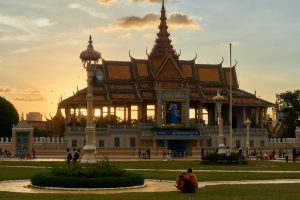Cambodia’s Prime Minister Hun Sen has set up an inter-ministerial working group to examine the granting of honorific titles to the wealthy, after a trickle of scandals involving the wealthy and well-connected.
Since the early 1990s, the title oknha, which is roughly equivalent to the English “lord,” has been granted by royal decree to civilians who contribute a significant amount of money (currently $500,000) to Cambodia’s government.
On May 17, Hun Sen ordered the establishment of an inter-ministerial working group to manage issues related to the oknha title and to review the legal process by which the title is granted and withdrawn.
Over the past three decades, hundreds of well-connected tycoons and business figures have received the title and have come to constitute a who’s who of the rich and well-connected in Cambodia. While the oknha title is formally granted by King Norodom Sihamoni, in practice the decision is made by Hun Sen and the ruling Cambodian People’s Party (CPP), which also controls the charitable donations offered in exchange for the title.
The honorific, an old royal title once offered by the Khmer kings to those who offered exceptional service to the throne, has thus become inseparable from the workings of Cambodia’s highly personalized political system, in which those with wealth, status, and political connections constitute a privileged, protected class.
Many oknha have amassed large fortunes, some through legitimate business ventures. But the title has also been used as cover for corrupt enterprises including illegal logging and sand mining, and criminal activities such as drug trafficking. Those holding the title have also very often enjoyed immunity from prosecution for a range of crimes, from bribery and illegal logging to rape and domestic violence.
The number of oknha has grown rapidly over the past three decades, as Cambodia’s economy has grown and its ruling elite has engaged in a scramble for wealth and privilege. According to The Cambodia Daily, just 20 individuals held the title in 2004. This rose to around 200 in 2008 and more than 700 by 2014.
Indeed, the growth in the number of oknha was so steep that in 2017 the government quintupled the “contribution” required to purchase it, from $100,000 to $500,000. This has not prevented the number of those holding the title growing to at least 1,000 people.
In a 2015 article, academics Michiel Verver and Heidi Schnetzinger described the oknha title as an expression of the reciprocal “elite pact” between the Cambodian business elite and the CPP leadership. As they argue, the oknha title “guides the identification and recruitment of businesspeople eligible to join the ‘elite pact’ based on the social, symbolic, and material resources they are able to deploy to cement their connections with the CPP elite and, in the final analysis, become an integral part of this elite.”
The establishment of an inter-ministerial working group to tackle Cambodia’s oknha “problem” demonstrates the extent to which bad behavior by title holders threatens to undermine the CPP’s legitimacy in the eyes of the Cambodian public. This is especially the case in the context of a long-running crackdown on any and all sources of political opposition to the CPP.
The prime minister’s move follows a number of scandals involving the wealth and well-connected. Among the most recent was that involving Duong Chhay, an oknha who was earlier this year caught on camera viciously beating his ex-wife. Duong Chhay had a long history of violence, but had mostly evaded punishment due to his wealth and personal connections. After the video went viral on social media, Hun Sen requested that Duong Chhay’s oknha title be revoked.
While assessing the use of this honorific is welcome news, it is unlikely to result in substantial change without more far-reaching reforms. It is not the oknha title that is pushing Cambodia’s wealthy elite to behave badly, but rather the political incentives inherent in the system. Absent systemic change, there is little to prevent Cambodia’s elite from continuing to abuse the power and wealth to which they have preferential access.

































